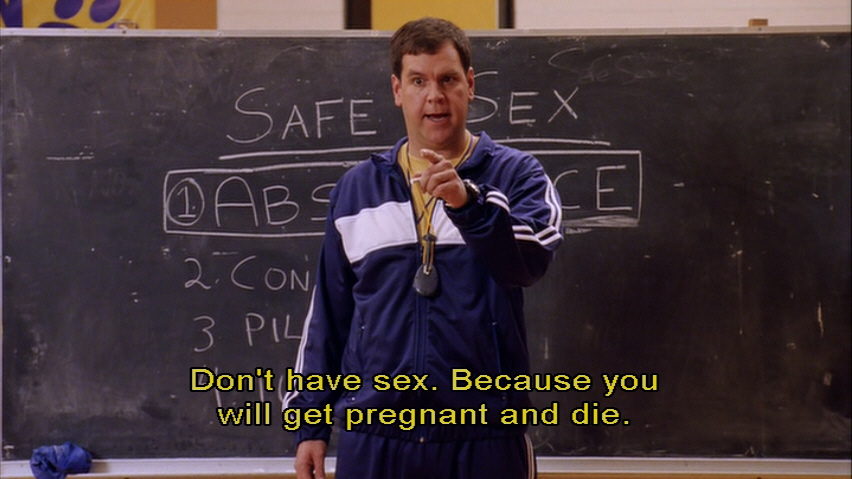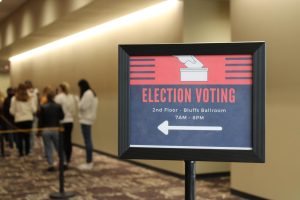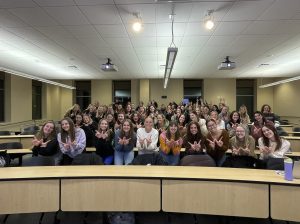Viewpoint: The U.S. is failing at Sex Education
March 22, 2018
Sex education at the K-12 level varies from school to school, but even with their obvious differences there is one goal – zero pregnancies.
Although this theory is heteronormative and unevolved, it serves as the benchmark for how far sex education must reach and what instructors may be able to ‘leave out.’ Because of this, abstinence-only education becomes implemented.
Abstinence-only education misleads and misjudges sexual circumstances between youths and limits resources and knowledge that could have developed comprehensive planning in pregnancy and STI prevention.
The U.S. has a problem with the teaching of sex education, but they would never allow any other academic program to fail students as much as sex education has.
The ambiguity in sex education of consent is a main issue, as sophomore Dylan Schock commented, “I was shown a video in middle school that discussed that any genital touch is forbidden while the other health teacher enacted comprehensive sex education, but it was heteronormative.
I wish my school would have talked about consent more and instituted a sex-positive approach. Sex is a spectrum, virgins are not losers and those who are more sexually active are not bad people. Practice sex how YOU feel the most comfortable [doing so].”
Schock’s experience was similar to many other University of Wisconsin – La Crosse students because many schools complete what is mandated, not going the extra mile. Aaron Ruud, sophomore, discussed the lack of detail his comprehensive education provided.
Ruud said, “I had comprehensive sex education but not until junior or senior year of high school when many people had already experimented sexually. The education we were taught was more so focused on the outdated aspects of the human anatomy realm, and less on birth control, pleasure, etc. Schools need to teach sex education at an early age to normalize the conversation.”
Comprehensive sex education is only successful when it is fully taught, not shaved down to baseline and objective education. Sophomore Amanda Krueger experienced a school that claimed to teach comprehensive sex education but whose educators did not.
Krueger claimed, “I guess my sex education was comprehensive, but they encouraged abstinence only and emphasized many risks of birth control methods and sex in general. There was a constant undertone that non-monogamous sex was trouble, even for adults.
I wish the education would have had less of a bias and overall heteronormative perspective. We did not learn about sex being a pleasurable act or how to have consensual and safe sex. Instead we were taught to be scared of it.”
Although most schools in America attempt to teach comprehensive sex education, many private schools do not have to adhere to these state laws. Matt Cash, a previous Catholic High School student and current freshman at UWL, discussed his unique experience attending a private religious K-12 education.
Cash noted, “I remember it being abstinence-only based. We learned that sex could cause diseases and that we had to be chaste until marriage and that abortion was a mortal sin. I was never shown a condom or taught about any other birth control methods. Overtime I saw my peers develop a careless attitude with sex and sexual health because no one ever told us what to do, just what not to do.”
States or schools that choose to teach un-comprehensive sex education or abstinence-only have created a negative connotation towards sex in general, but especially those who engage in sex before they are married.
We encourage our youth to develop love interests from a young age and enter the dating pool, but shame them when they want to take their relationship in a path society disagrees with due to cultural norms and mass media consumption.
Comedian John Oliver discussed the failure that is sex education in America. Oliver said, “The idea that sex devalues those who’ve had it, particularly women, shows up again and again. Non-virgins are linked to a used toothbrush or a chewed piece of gum. We institute abstinence-only education but then continue to leave out what informed and enthusiastic consented sex looks like.”
The current sex education in the U.S. sees the problem as black and white – sex or no sex. Exploring your sexuality is never black and white, nor is sex. We must first teach our youth to be safe, but above all things teach them that their virginity is a social construct, but it is a social construct that is their choice when, how, who, and where to give away.








